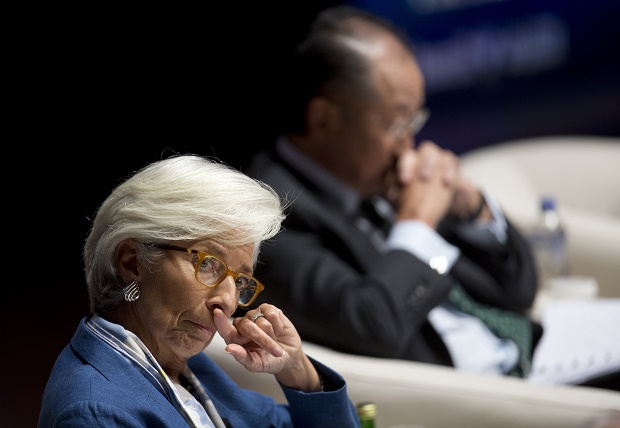
International Monetary Find (IMF) Managing Director Christine Lagarde and Bank President Jim Yong Kim attend a forum in Lima, Peru, Wednesday, Oct. 7, 2015, during the annual meetings of the World Bank Group and IMF. Latin America’s economy is expected to enter recession this year for the first time since the end of the global financial crisis as China’s slowdown drives lower demand for the region’s commodities, threatening to undo recent progress in reducing poverty, the International Monetary Fund said Wednesday. AP Photo
LIMA, Peru—The IMF cautioned Wednesday that China faces unprecedented challenges modernizing its economy, carrying risks for the whole world, but a Chinese official brushed off the warning, saying: “Don’t worry.”
READ: IMF gloomy on world economy as China slows
China’s effort to transition to a more market- and consumption-based economic model will be a monumental, risk-fraught task that will “require great care,” the International Monetary Fund said in its new review of global financial risks.
And the implications reach far beyond China: The world’s second-largest economy is a lynchpin of global growth and a vital trade partner for fellow emerging markets, which depend heavily on the Asian giant’s imports of their fuels, metals, minerals and other commodities.
“The Chinese authorities face an unprecedented policy challenge in carrying out their objectives to make the transition to a new growth model and a more market-based financial system,” the IMF said.
“Achieving this outcome will require careful pacing of reforms and policy consistency.”
But a senior Chinese central bank official sought to downplay concerns that China’s slowdown will weigh on the global economy.
“I would say don’t worry,” said Yi Gang, deputy governor of the People’s Bank of China.
READ: IMF chief: We’re cooked if we fail on climate change
“China will still have pretty much middle-to-high growth in the near future,” Yi said in the Peruvian capital Lima, where policy makers from around the world were gathering to review the state of the global economy at the annual meetings of the IMF and World Bank.
He insisted that Chinese imports of raw materials for its industrial economy will grow steadily in the future.
The focus on China came in the IMF’s new Global Financial Stability Report, which stresses the increased dangers across the emerging markets from slow growth and global market turbulence, to very high levels of corporate borrowing.
If not handled well from a policy viewpoint, the cost to the world economy of the emerging market downturn could be a huge three percent of global output, warned IMF Financial Counselor Jose Vinals.
“The recommendation is for an urgent upgrade in policies, so as to avoid downside risks,” he said.
In the worst scenario, corporate default rates could rise, particularly in China, “raising financial system strains, with implications for growth,” the report said.
A particular risk is that emerging markets’ state-owned enterprises like those in the energy sector, which have raised huge amounts of funding by issuing bonds, could find themselves falling back on governments to service their debt.
That could raise the risk of governments seeing their credit grades lowered to non-investment grade or junk status, as in Brazil a month ago, the IMF said.
Legacies of central planning
The IMF said China will have challenges dealing with the legacies of its old centrally planned system as it moves to a more market-driven economy.
Chinese banks, for example, have only just begun to deal with growing problems on their loan books due to the difficulties many Chinese companies are having, the Fund said.
On Tuesday, the IMF cut its global growth forecasts to 3.1 percent this year and 3.6 percent in 2016, both numbers 0.2 percentage points lower than forecasts just three months ago.
The Fund made particular mention of the increasing global challenge from the growth pains in China, whose economy is forecast to expand 6.3 percent next year, its lowest rate in 25 years.
Prices of commodities from oil to metals to grains have slumped over the past two years, taking a strong hit on emerging economies and government budgets around the globe.
“Commodity prices are highly volatile and unpredictable, posing significant challenges to policymakers in resource-rich economies,” the IMF said.
The Fund said that natural resources should be a blessing for a country, but that many have struggled to leverage such resources to improve living standards and deepen economic strength.
“Especially in the case of exhaustible mineral and hydrocarbon wealth, many countries have apparently suffered from what is often termed a ‘resource curse,'” when a country with abundant natural wealth lags in development for a range of complex reasons, it said.

